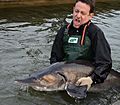Sturgeon facts for kids
Quick facts for kids Sturgeon |
|
|---|---|
 |
|
| Atlantic sturgeon (Acipenser oxyrinchus oxyrinchus) |
|
| Scientific classification | |
| Kingdom: | |
| Phylum: | |
| Class: | |
| Order: |
Acipenseriformes
|
| Family: |
Acipenseridae
|
| Subfamilies | |
|
Acipenserinae |
|
Sturgeon are a group of 26 different kinds of fish. They belong to a family called Acipenseridae. These amazing fish are known for their ancient looks and can be found in many parts of the world.
Contents
Ancient Fish
Sturgeon are often called "living fossils." This means they look very similar to their ancestors from millions of years ago. Their features have not changed much since the first sturgeon fossils were found. This makes them very special!
Where Sturgeon Live
Sturgeon live in waters that range from warm subtropical areas to very cold sub-arctic regions. You can find them in North America and Eurasia.
Sturgeon in North America
In North America, sturgeon live along the Atlantic coast. Their range goes from the Gulf of Mexico all the way up to Newfoundland. They used to be common in the Mississippi River, the Great Lakes, and the Hudson River.
Threats to Sturgeon
Sadly, almost all types of sturgeon are now in danger. Many are highly threatened or vulnerable to disappearing forever. This is because of a few main reasons:
- Their homes (habitats) are being destroyed.
- Too many of them are being caught (overfishing).
- Water pollution is harming them.
Sturgeon and People
A long time ago, sturgeon were sometimes seen as a problem. They would get caught in fishing nets and rip them. But later, people realized how valuable these large fish were.
Uses of Sturgeon
Sturgeon became prized for their meat and their eggs, which are called caviar. People also used their oil. Another interesting use was for a substance called isinglass. This was made from the inner lining of their air bladder. Isinglass was used to make jellies clear, in glues, and even for windows in old carriages and early cars.
Today, if you look closely in reedy shallow waters or near river mouths, you might sometimes spot the dark shape of a lake sturgeon.
Images for kids
-
The high demand for caviar has put many sturgeon species at risk of extinction.
-
St Amalberga riding a sturgeon.
See also
 In Spanish: Esturiones para niños
In Spanish: Esturiones para niños
 | Shirley Ann Jackson |
 | Garett Morgan |
 | J. Ernest Wilkins Jr. |
 | Elijah McCoy |






